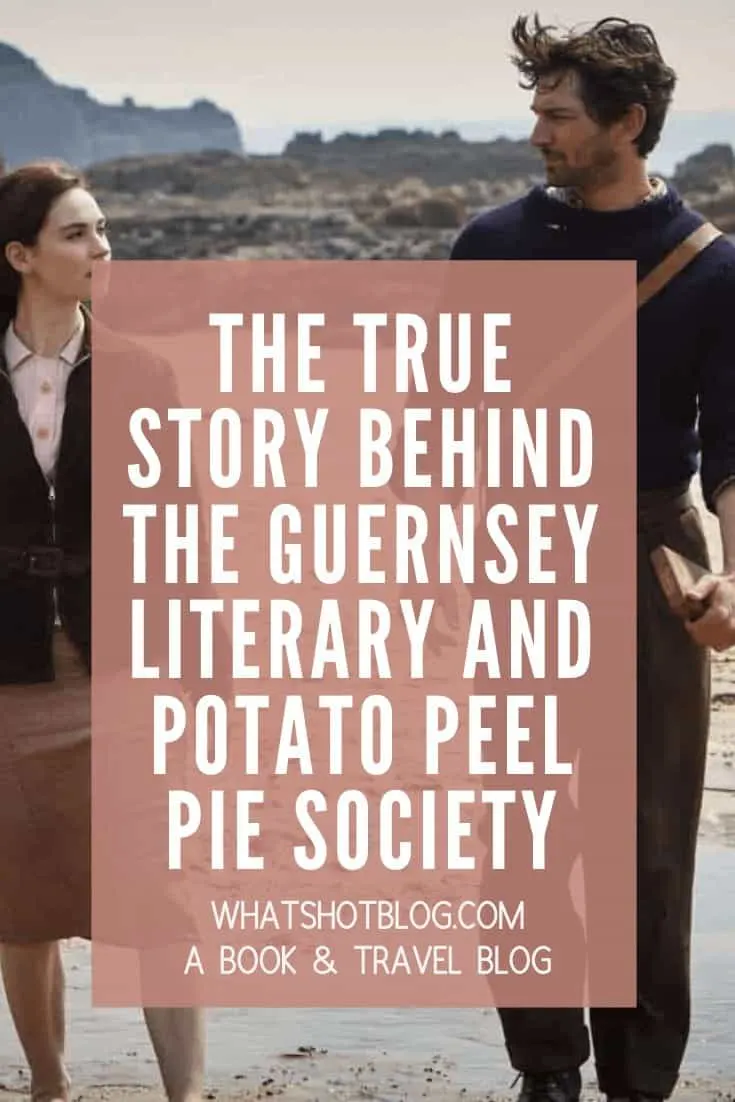Have you been wondering to yourself “is the Guernsey Literary and Potato Society true?” or “was the guernsey literary society real?” then this post is for you! We separate fact from fiction comparing the book and film with real-life on Guernsey during WW2.

9 May is Liberation Day on the island of Guernsey. It seems an appropriate time, then, to share the true story behind one of my favourite books, “The Guernsey Literary and Potato Peel Pie Society”.
Disclosure: This is a sponsored post in collaboration with Visit Guernsey. However, the fascination with Guernsey is all mine.
If you haven’t gathered by now, I’m a huge fan of both the book and film and I recently had the great privilege of hosting my own preview screening of the film with Vue. If you haven’t seen the film yet, you need to and you can check out my film review of The Guernsey Literary and Potato Peel Pie Society here.
The story of Guernsey has immensely fascinated me ever since I opened turned the first page of this book, in much the same way as Juliet Ashton is enamoured by Dawsey’s letters.
It seems to be a little-known fact that after the Allied defeat in France in 1940, Germany invaded and occupied the Channel Islands.
This sets the scene for The Guernsey Literary and Potato Peel Pie Society but just how much of the book is actually based on reality? Is the Guernsey Literary and Potato Society a true story?
I’ve done a bit of research with the help of Visit Guernsey and here’s what I discovered!


Guernsey was not at all defended by Britain
“Would you like to know about my first sight of the Germans? I will use adjectives to make it more lively. I don’t usually – I prefer stark facts.
Guernsey seemed quiet that Tuesday – but we knew they were there! Planes and ships carrying soldiers had come in the day before. Huge Junkers thumped down, and after unloading all their men, they flew off again. Being lighter now, and more frolicsome, they hedge-hopped, swooping up and swooping down all over Guernsey, scaring the cows in the fields.“
The Channel Islands were occupied by the Germans from the 30 June 1940 until the end of World War II. Winston Churchill decided that the islands were of little “strategic importance” so the islands were left undefended when the Germans came.
No official announcement had been made informing the Germans that the Channel Islands were in fact demilitarised, so they began their invasion. The planes mistook tomato trucks lined up at the harbour for military vehicles and thirty-three civilians lost their lives in the raid.
Almost half of Guernsey’s population was evacuated
“Of all the sights I saw the day they left, there is one picture I can’t get out of my mind. Two little girls, all dressed up i pink dresses, stiff petticoats, shiny shoes – as if they were off to a party. How cold they must have been crossing the Channel.”
There was a lot of confusion as to whether the Channel Islands would be evacuated so it was a panicked affair. On 19 June 1940, parents were told to register their children to be evacuated and some were sent away the very next morning.
In the end, four-fifths of the children and almost half of Guernsey’s population were evacuated before the occupation. In actual fact, evacuation boats were still leaving the island when the German Air Force began their invasion!
Hitler wanted to create an “impregnable fortress”
“The Germans laid barbed wire all along. They mined all the beaches. They set these gun positions all over, put up the lookout towers. Turned Guernsey into a Fortress”
When Hitler realised that he would not be able to conquer Britain, he ordered the Channel Islands to be turned into an impregnable fortress, as part of the Atlantic Wall. This wall was to serve as a defence against any Allied invasion. Hitler was keen to fortify the small piece of Britain he had managed to occupy.
Guernsey’s coastline was heavily laden with concrete, making up for 8% of the entire Atlantic Wall, which covered the coast of Western Europe and Scandinavia. In fact, the tiny island of Guernsey was one of the most fortified places on Earth at the time!
They built bunkers, gun emplacements, tunnels and more. The concrete can still be seen on Guernsey today.
Prisoners of war were used to build this
“Most of these slave workers came to the Islands in 1942. They were kept in open sheds, dug-out tunnels, some of them in houses. They were marched all over the island to their work sites: thin to the bone, dressed in ragged trousers with bare skin showing through, often no coats to protect them from the cold. No shoes or boots, their feet tied up in bloody rags. Young lads, fifteen and sixteen, were so weary and starved they could hardly put one foot in front of another. Guernsey Islanders would stand by their gates to offer them what little food or warm clothing they could spare.”
Thousands of manual labourers were brought over from Europe to help build this fortress. Whilst skilled labourers were provided with a small wage, a large number were prisoners of war and treated like slaves without food or decent shelter. They were forced to work long hours on fortifying Guernsey, which, ultimately, was a fruitless exercise.


Time shifted to Central European time
“Talking and eating, we forgot about clocks and curfews until Amelia (Mrs Maugery) heard the chimes ring nine o’clock – we were an hour late.”
At the start of the occupation, time was shifting to Central European time. This may seem pretty minor compared to the rest of the stuff, but it must’ve seemed pretty strange at first! Curfews were also put in place so you did not want to be caught wandering around at night.
Of course, that’s how the Guernsey Literary and Potato Peel Pie Society was founded.
Guernsey was cut off from the outside world
“In 1942, the Germans called in all the wireless sets – of course, there were hidden ones, listened to in secret, but if you were caught listening, you could be sent to the camps. That’s why we don’t understand so many things we can read about now.”
All radios were banned, and the islands were cut off from Britain and the outside world. Any news that they did get was heavily distorted by German propaganda. They had no real clue how they were faring in the war.
After D Day, supplies to the island also dried up and both locals and Germans were at risk of Starvation.
Alcohol was scarce during the war
” “I’ve seen enough. I need a drink.”
I keep a good supply of gin in my cupboard, so we came home.”
Whilst Isola’s stock of home-brewed spirits kept the Society’s spirits up in the book and film, alcohol was actually very scarce during the war. Today, however, there are numerous gin tours and tastings on Guernsey!
Meet the real gin makers of Guernsey here.
Islanders sheltered escaped slave workers
“Elizabeth, as feckless as ever, committed a criminal act expressly forbidden by the German Occupying Force – she helped shelter and feed an escaped prisoner of the German Army. She was arrested and sentenced to prison on the Continent.”
Despite the severe cost if discovered, numerous islanders tried to help the slave workers by sheltering them in secret, just like Elizabeth in The Guernsey Literary and Potato Peel Pie Society.


A secret society really did exist
“Why did a roast-pig dinner have to be kept a secret? How could a pig cause you to begin a literary society? And, most pressing of all, what is a potato peel pie – and why is it included in your name? “
The question on the tip of everyone’s tongue is “is the Guernsey Literary and Potato Society real?”.
Unfortunately, The Guernsey Literary and Potato Peel Pie Society is, and always has been, fictional. However, there was another secret society on the island at the time: the Guernsey Underground News Service, aka GUNS.
The island was completely cut off from the outside world during the occupation, but this group managed to keep up to date using secret radios. They would then create secret newsletters to distribute to civilians on the island!
Read more about the Guernsey Underground News Service here.
The German occupation lasted five years
“What a morning that must have been! The crowds were lined up along St Peter Port’s harbour. Silent, absolutely silent: masses of people looking at the Royal Navy ships sitting just outside the harbour. Then when the Tommies landed and marched ashore, all hell broke loose. Hugs, kisses, crying, shouting.”
Guernsey was finally liberated on 9th May 1945, five years after the occupation began.
To quote Winston Churchill, “our dear Channel Islands are also to be freed today”, which seems a little wry given that the Islands were basically abandoned and deemed of little “strategic importance” before the occupation.
Today, 9 May is deemed a national holiday on the Channel Islands and huge crowds gather at St Peters Port every year to celebrate!
–
If you feel inspired to visit the island of Guernsey now, you can find out more from the Visit Guernsey website. They’ve also created a fantastic movie tie in website, which explains the true story behind The Guernsey Literary and Potato Peel Pie Society in even greater detail, including pictures, videos and clippings.
If you liked this post, check out these:
Film Review: The Guernsey Literary and Potato Peel Pie
Book Review: The Guernsey Literary and Potato Peel Pie Society
Book Review: Look Who’s Back by Timur Vernes
Book Review: Of Love and Other Wars by Sophie Hardach
Love this post? Pin it for later!


Laura
Editor of What’s Hot?
[This post was first published in May 2018 and was updated in 2021]

Louise
Saturday 2nd of June 2018
I love the idea behind this post, exploring the truth behind your favourite book! I've never read it but I think I'd like to now x
Fatima Ali
Saturday 2nd of June 2018
I was able to learn a lot of new things from this post. You’ve written it so well that the flow entangled me to read it till the end.
Dena Jayne
Saturday 2nd of June 2018
Guernsey is a place I've always wanted to go, this post made me want to go even more!
Kacie Morgan
Saturday 2nd of June 2018
I love it when a book almost seems to come to life in the way the story is told :)
Hollie Burgess
Saturday 2nd of June 2018
What a great post! I've popped the book on my reading list.